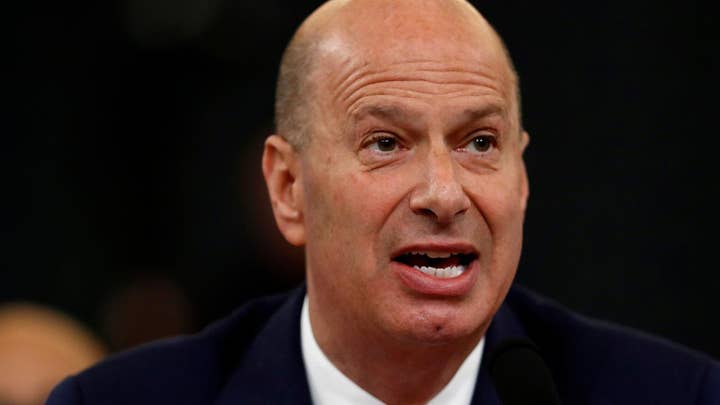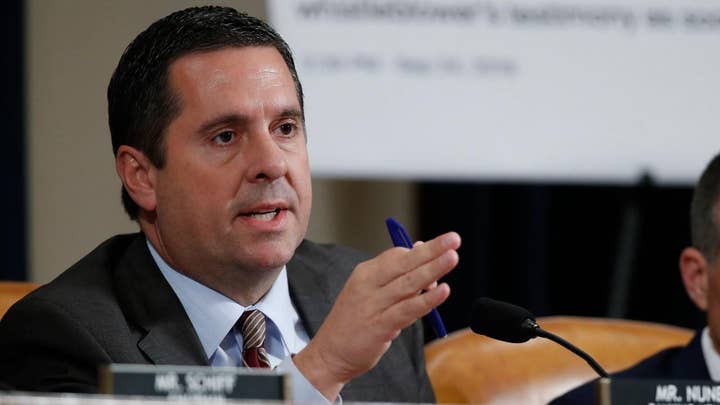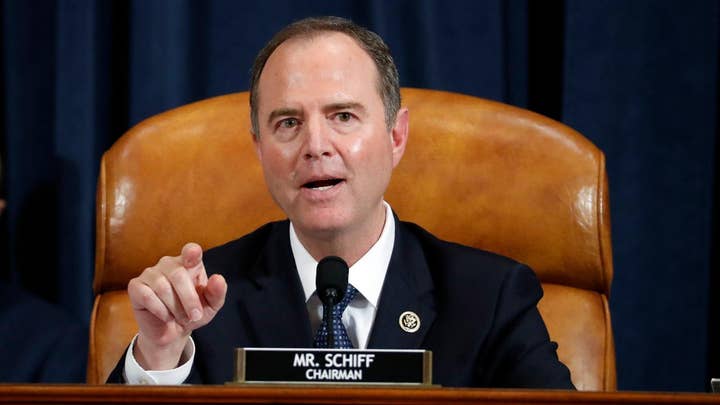Sondland implicates top officials on Ukraine, but says he ‘never heard’ quid pro quo from Trump
European Union ambassador Gordon Sondland tied top officials to the “potential quid pro quo” involving U.S. military aid to Ukraine and investigations desired by President Trump during his highly anticipated impeachment hearing testimony on Wednesday – yet said he never heard that link from the president himself.
One of the key witnesses in the Democrat-led impeachment inquiry against Trump, Sondland claimed he kept Secretary of State Mike Pompeo aware of what was going on and said he specifically told Vice President Pence he "had concerns" the military aid to Ukraine "had become tied" to investigations -- though a Pence aide denied it. And he repeatedly lambasted Trump lawyer Rudy Giuliani’s leading role in the administration’s Ukraine dealings.
"Everyone was in the loop," Sondland testified. "It was no secret."
READ: GORDON SONDLAND'S IMPEACHMENT HEARING OPENING STATEMENT
Still, in comments seized upon by Republicans, Sondland testified: “I never heard from President Trump that aid was conditioned on an announcement" of investigations. He said he never personally heard Trump discuss preconditions. And at one point, he confirmed Trump told him, "I want nothing."
Taken in their entirety, Sondland's statements Wednesday are likely to fuel the narratives of both parties. He was seen as a wild card going into the hearing, given he has offered testimony that conflicted with others' and recently amended his statements to acknowledge he did talk to Ukraine about investigations after initially indicating otherwise.
The impeachment inquiry was sparked by a whistleblower’s complaint about Trump's July 25 call when he asked Ukraine President Volodymyr Zelensky for political investigations – including involving former Vice President Joe Biden's family -- at the same time U.S. military aid for the ally was stalled.
Sondland made clear Wednesday he merely presumed the aid was linked to investigations, at one point referring to this as a "guess."
But he suggested he had his reasons, agreeing that the conclusion was like "two plus two equals four." He stressed he never got a clear answer on why the aid was held up, saying in the absence of an explanation he came to believe that the aid and the investigations were linked.
“I shared concerns of the potential quid pro quo regarding the security aid with Senator Ron Johnson,” Sondland said at one point, referring to the Republican senator involved in Ukraine policy. “And I also shared my concerns with the Ukrainians.”
Further, his testimony name-dropped a slew of other top Trump officials, which is likely to pique Democrats' interest.
Sondland, throughout the inquiry, has been portrayed as a key player in an irregular channel of diplomacy led by Giuliani. On Wednesday, Sondland repeatedly expressed his displeasure with Giuliani's involvement in Ukraine policy but said they were working with him at Trump's direction. He also claimed the “suggestion that we were engaged in some irregular or rogue diplomacy is absolutely false.”
“We did not want to work with Mr. Giuliani,” Sondland said, explaining he believed State Department officials should take the responsibility for Ukraine matters. “Simply put, we played the hand we were dealt. We all understood that if we refused to work with Mr. Giuliani, we would lose an important opportunity to cement relations between the United States and Ukraine. So we followed the president’s orders.”
While couching his language regarding the aid hold-up, Sondland was more explicit when it came to the link between investigations and a White House meeting and call between Trump and Zelensky. He bluntly described Giuliani's requests linking the two as a quid pro quo.
He told the committee: “I know that members of this committee have frequently framed these complicated issues in the form of a simple question: Was there a ‘quid pro quo? ... As I testified previously, with regard to the requested White House call and White House meeting, the answer is yes.”
Sondland also said he and other officials “disagreed with the need to involve” Giuliani but they “did not believe that his role was improper at the time.” He said that "as a presidential appointee, I followed the directions of the president.”
“If I had known of all of Mr. Giuliani’s dealings or of his associations with individuals now under criminal indictment, I would not have acquiesced to his participation,” Sondland said. “Still, given what we knew at the time, what we were asked to do did not appear to be wrong.”
Giuliani on Wednesday pushed back against Sondland’s testimony, tweeting he “came into this” at the request of then-Ukraine envoy Kurt Volker. “Sondland is speculating based on VERY little contact," Giuliani tweeted. "I never met him and had very few calls with him, mostly with Volker."
Meanwhile, Sondland described a Sept. 1 meeting between Zelensky and Pence in Warsaw. “I mentioned to Vice President Pence before the meetings with the Ukrainians that I had concerns that the delay in aid had become tied to the issue of investigations,” Sondland said.
But on Wednesday, Pence’s office flatly denied the accusation, saying, “This alleged discussion recalled by Ambassador Sondland never happened.”
He also repeatedly connected the secretary of state to the Ukraine efforts.
Sondland testified that Pompeo, as late as Sept. 24, was telling Volker to speak with Giuliani. He said Volker sent him a WhatsApp message that said, “Spoke w Rudy per guidance from S.” Sondland said “S” was in reference to the secretary of state.
He also described another conversation on Sept. 1 in Warsaw with Zelenksy’s senior aide, Andriy Yermak, saying he expressed concerns that the resumption of U.S. aid would likely not occur until Ukraine took some kind of action on the public statement about investigations. “Based on my communications with Secretary Pompeo, I felt comfortable sharing my concerns with Mr. Yermak,” he said.
State Department spokeswoman Morgan Ortagus later denied that the secretary of state talked with Sondland about the aid link: "Gordon [Sondland] never told Secretary Pompeo that he believed the president was linking aid to investigations of political opponents. Any suggestion to the contrary is flat out false.”
On Wednesday, Sondland said he was not on the July call and didn’t read a transcript until it was publicly released in September. He called it “very odd” that he never received a detailed read-out of the call with the Biden references. Sondland also repeatedly made clear he did not support preconditions on the aid.
“We had no desire to set any conditions on the Ukrainians,” Sondland said. “Indeed, my personal view -- which I shared repeatedly with others -- was that the White House meeting and security assistance should have proceeded without pre-conditions of any kind.”
Sondland on Wednesday said his goal, at the time, was to do what was necessary to get the aid released. Asked if it's true he told Trump at one point that Zelensky "loves your ass," the diplomat replied "sounds like something I would say" to laughter in the hearing room.
Republicans dismissed the proceedings as they have done during previous sessions. California Rep. Devin Nunes, the GOP’s top member on the committee, told the witness: "Ambassador Sondland, you are here today to be smeared.”
Nunes also reiterated calls for the committee to subpoena Hunter Biden, the whistleblower who wrote the complaint against Trump and Democratic National Committee documents – something Democrats have not granted.
VINDMAN ACCUSES TRUMP OF MAKING IMPROPER UKRAINE ‘DEMAND,’ SAYS HE ALERTED INTEL OFFICIAL
Republicans on the committee also defended Trump by emphasizing how Ukraine got what they wanted without ever announcing an investigation. “They didn’t have to do anything,” Ohio GOP Rep. Jim Jordan said, adding “they get the call, they get the meeting, they get the money."
Jordan accused Sondland of getting all three of those "wrong": “It’s not two plus two, it’s 0 for 3.”
Sondland later expressed frustration when a Democratic congressman, Sean Maloney on New York, repeatedly tried to get him to say Trump would benefit from an investigation of the Bidens. He eventually said, "I assume President Trump would benefit."
The diplomat added: “I’ve been really forthright, and I really resent what you’re trying to do.”
Maloney mocked Sondland for having to previously amend his testimony. “We appreciate your candor, but let’s be clear what it took to get it out of you,” he said.
Meanwhile, the top committee Democrat, Rep. Adam Schiff, in his opening remarks accused Trump and Pompeo of making "such a concerted and across-the-board effort to obstruct this investigation and this impeachment inquiry." Schiff added, "They do so at their own peril."
Sondland's appearance at Wednesday morning's hearing, and his closeness to Trump, is of particular concern to the White House as the historic impeachment inquiry reaches closer to the president, pushing through an intense week with nine witnesses testifying over three days in back-to-back sessions. But Trump, talking to reporters outside the White House on Wednesday, referenced Sondland's comments that he wanted nothing from Ukraine and argued, “That means it’s all over.”
Among the details that other witnesses have filled in are those concerning a call he placed to Trump from a busy Kiev restaurant the day after the president prodded Ukraine's leader to investigate the Bidens. After another diplomat witness revealed this, Sondland confirmed Wednesday they had the call -- saying Sondland doesn't remember much of it but has no reason to doubt other accounts, which said the conversation dealt with the topic of investigations.
Sondland, who has had to amend his testimony related to his conversations with Ukraine, told lawmakers he has had hundreds of meetings and calls with individuals in his role but is not a note-taker. He said he has requested documents from the State Department and the White House for documents phone records to help refresh his memory. “In the absence of these materials, my memory has not been perfect,” he said.
Sondland's appearance follows the testimony Tuesday of four national security and diplomatic officials, including Lt. Col. Alexander Vindman, a career Army officer, who described Trump's call with Zelenskiy as "improper." Also testifying later Wednesday are Pentagon official Laura Cooper and Under Secretary of State for Political Affairs David Hale.
The Associated Press contributed to this report.
























